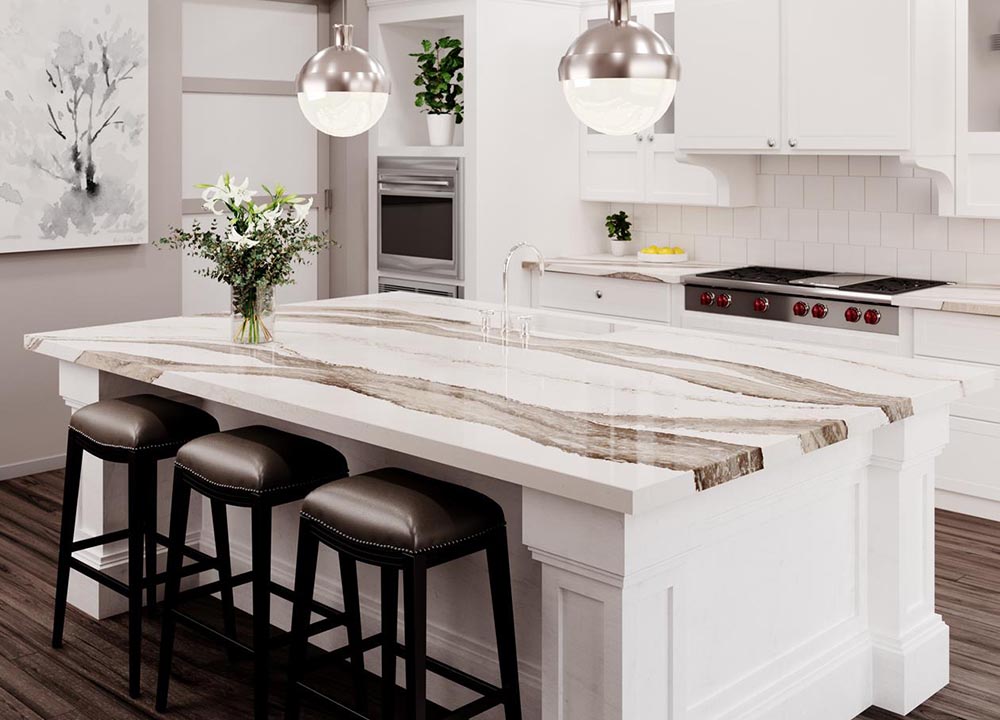Everything You Need to Know
When it comes to choosing the right type of countertop for your kitchen or bathroom remodel, few materials are as versatile and durable as quartz countertops. Known for its beauty, ease of maintenance, and exceptional resilience, this natural and synthetic blended material is a popular choice for homeowners looking to elevate their spaces. In this guide, we’ll explore why these countertops are a fantastic option, covering everything from installation to proper care and maintenance.
Below, our professionals at Karin Ross Designs explain everything you need to know about this beautiful and versatile countertop material option.
What Are Quartz Countertops?
Quartz countertops are engineered surfaces made from a blend of natural quartz crystals and synthetic resins. This fusion results in a non-porous, highly durable material that can withstand the rigors of everyday use. Unlike natural stone countertops, such as granite, quartz provides a more consistent look, with a wide variety of quartz countertop colors and patterns to choose from. Additionally, they are non-porous and do not require sealing.
Because quartz countertops are engineered, they offer flexibility in design that natural stones cannot. While granite countertops are cut from large slabs of stone, each piece is unique with its own variations, making it challenging to match the exact look in larger spaces. With these countertops, however, homeowners can enjoy a uniform aesthetic that flows seamlessly throughout their kitchen countertops or bathroom countertops.
The Colors of Quartz Countertops
One of the biggest advantages is the vast array of colors and patterns available. Unlike natural stone, where each slab is unique, quartz countertops offer a more consistent, uniform appearance. Whether you prefer subtle whites, sleek blacks, or bold veined patterns, there’s a quartz countertop color to match every style.
From minimalist designs to intricate, marble-like finishes, quartz countertop colors can complement any kitchen or bathroom aesthetic. You can even find options that mimic the appearance of natural stones, like marble or granite, with all the durability and low maintenance of quartz.
How Durable Are Quartz Countertops?
Made from one of the hardest minerals on Earth, quartz countertops are highly resistant to scratches, chips, and cracks. This makes them known for their incredible durability. Their non-porous nature also makes them highly stain resistant, a common problem with other countertop materials.
While they are extremely durable, they should still be cared for properly. It’s important to avoid placing hot pans directly on the surface, as extreme temperatures can damage the resin. Additionally, although quartz is resistant to most damage, using cutting boards and trivets can help extend their lifespan and keep them looking pristine.
The Benefits of Quartz Countertops
Quartz countertops are revered for their practicality and stunning visual appeal. One of the most notable benefits is their durability. They are highly resistant to scratches, chips, and stains, making them an excellent choice for busy kitchens and bathrooms. Their non-porous nature means that they don’t absorb liquids, reducing the likelihood of staining and making them far easier to clean than natural stone countertops.
Beyond durability, these countertops offer a variety of design options. Whether you prefer the sleek elegance of a monochromatic white surface or the bold statement of veined designs, quartz can fit any style. The consistency of its patterns and colors is ideal for homeowners who want a harmonious, modern look throughout their space.
Do Quartz Countertops Stain or Scratch?
A common question from homeowners is whether quartz countertops stain. The short answer is no. These countertops are highly resistant to most stains. Thanks to their non-porous surface, liquids such as wine, coffee, and juice won’t seep into the stone, leaving permanent marks. However, as with any surface, it’s best to clean up spills promptly, particularly from acidic substances like citrus or vinegar, to avoid any potential discoloration.
Quartz countertops are also very resistant to scratches. While they are tougher than many other countertop materials, it’s important to note that they are not completely scratch-proof. Using a cutting board and trivets for hot pots and pans is always recommended to protect the surface.
Using Quartz Countertops in Bathrooms
Due to their durability and resistance to water and staining, quartz countertops are a perfect choice for bathrooms. Their non-porous nature means that they won’t absorb moisture, preventing the growth of mold and mildew. Whether you’re remodeling a small powder room or a spacious master bathroom, quartz can add a touch of elegance while remaining practical.
Whether you want a sleek and modern aesthetic or a more traditional, luxurious design, bathroom countertops can be customized to suit the look of your bathroom.
Using Quartz Countertops in Kitchens
If you are embarking on kitchen remodeling, remember that quartz countertops shine. Their ability to withstand heavy use makes them an excellent choice for cooking and entertaining. Quartz used in kitchens offers resistance to scratches, stains, and heat (within reason), making them perfect for high-traffic areas.
Moreover, quartz countertops are incredibly low-maintenance, requiring just occasional cleaning with mild soap and water. Available in a variety of designs and colors, quartz can be used for everything from countertops to kitchen islands, backsplashes, and even flooring. Whether you’re looking for a sleek, contemporary style or a more rustic design, these countertops provide the versatility and durability your kitchen needs.
Are Quartz Countertops Heat Resistant?
One of the advantages of quartz countertops is their heat resistance. While they can withstand typical kitchen temperatures, it’s important to note that they are not as heat-resistant as granite.
Extended exposure to high temperatures can cause the resin in quartz countertops to soften, potentially leading to discoloration or even damage. For this reason, always use trivets or hot pads when placing hot cookware on your countertops to preserve its longevity.
Installing Quartz Countertops
Installing quartz countertops requires precision, as these heavy slabs need to be carefully measured, cut, and positioned to ensure a perfect fit. While some homeowners may consider a DIY approach, it is strongly recommended to have professional installation done. The installation process typically involves measuring the space, selecting the ideal quartz design, and ensuring that the countertop is properly sealed and aligned.
Professional countertop installers will also handle the weight of the quartz, as the slabs are dense and require specialized equipment for safe transport and installation. Working with an experienced countertop installer ensures that the countertop installation is done properly, reducing the risk of damage and providing a lasting, secure installation.
How to Clean and Maintain Quartz Countertops
Cleaning quartz countertops is very easy, thanks to their non-porous nature. Below are some simple tips for maintaining the natural beauty of your countertops.
Regular Cleaning
Use a mild dish soap and warm water to wipe down your countertops daily. A soft cloth or sponge will remove any dirt or residue without damaging the countertop surface.
Tougher Stains
For more stubborn stains, mix a small amount of baking soda with water and gently scrub the affected area. Avoid abrasive cleaners or harsh chemicals that could damage the surface.
Avoiding Damage
While quartz countertops are durable, it’s essential to use cutting boards and avoid placing hot items directly on the surface. Heat pads and trivets will protect the countertops from thermal damage.
Quartz Countertop Costs and Budgeting
The cost of quartz countertops varies depending on several factors, including the quality of the material, the complexity of the design, and the size of the space. On average, these countertops range from $50 to $150 per square foot, though high-end designs and larger installations can push the cost higher.
When budgeting for your remodel, it’s essential to factor in both the cost of the countertops and the installation. Professional countertop installation typically ranges from $30 to $60 per square foot, depending on the installer and your location. Though the upfront cost of quartz can be higher than other materials like laminate or ceramic tile, its durability and low maintenance make it a cost-effective choice in the long run.
Are Quartz Countertops the Right Choice for Your Remodel?
For homeowners looking to combine style, functionality, and low maintenance, quartz countertops are a fantastic option. Their durability, aesthetic appeal, and ease of cleaning make them an ideal choice for both kitchens and bathrooms. Whether you’re upgrading your home for personal enjoyment or increasing its value for a future sale, countertops made of quartz offer a timeless solution.
If you’re in the Kansas City area and are ready to transform your space with beautiful, long-lasting quartz countertops, our expert team is here to help you bring your vision to life. Let us guide you through every step of the remodeling process, from selecting the perfect design to flawless installation. Don’t wait to elevate your home. Schedule your consultation with Karin Ross Designs today, and let’s create something extraordinary together.
SOURCE:
This Old House – Countertops Buying Guide: Quartz










